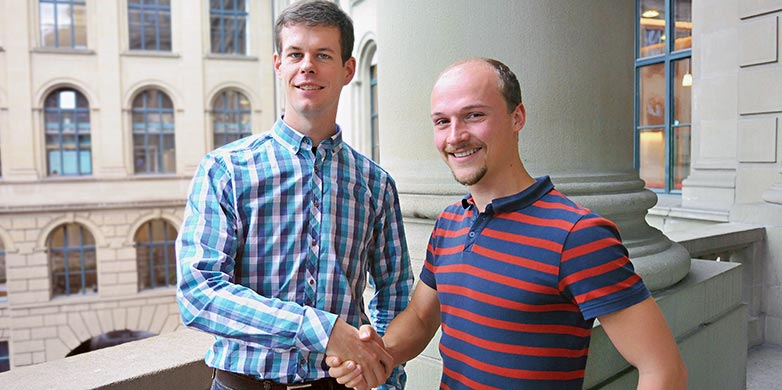ETH doctoral students: Goodbye to ‘pseudo-part-time’ employment
A boost for non-professorial scientific staff at ETH Zurich: as of this September, all 16 ETH departments have their own associations for scientific staff. In addition, doctoral students at ETH are now to be employed on a strictly full-time basis.
AVETH, the Academic Association of Scientific Staff at ETH Zurich, currently has two reasons to celebrate: firstly, since the General Assembly on 23 September, all 16 university departments now have their own department associations for non-professorial scientific staff.
Secondly, the Executive Board of ETH Zurich decided on 16 September that, from next year, doctoral students at ETH will be employed on a strictly full-time basis. From 1 January 2015 onwards, part-time employment of doctoral students must be justified – e.g. parenthood or work commitments for another employer.
The focus shifts from part-time to full-time
As far as AVETH is concerned, this ‘change of philosophy’ (see box) in favour of full-time employment for doctoral students is a great success in terms of university policy: the association has long been calling for ETH to do away with ‘pseudo-part-time’ employment and to actually pay full-time salaries to doctoral students who work full-time hours.
AVETH President Lars Büthe is therefore content with the new philosophy on the whole, especially since it allows doctoral students who have a second job to work part-time.
The President of AVETH also sees the new regulation for doctoral salaries as a good example of how AVETH can work with the non-professorial scientific staff representatives from the 16 departments: ‘The circumstances in which doctoral students and researchers work vary from department to department’, says Lars Büthe, who is himself a doctoral student from the Department of Information Technology and Electrical Engineering (D-ITET).
‘That is why we at AVETH seek widespread support when it comes to addressing the concerns of all the academic non-professorial staff.’
Establishment of associations completed
In September, AVETH took a major step forward in its dialogue with the departments. At its General Assembly on 23 September, it recognised the professional association SAM (Scientific Staff Association at the Department of Materials) as the official representative body for non-professorial scientific staff in the Department of Materials (D-MATL).
This completed the process and all departments now have their own association. These department associations represent the interests of doctoral students, postdocs and scientific staff at departmental level, while AVETH, as an umbrella organisation, serves their interests across ETH as a whole.
‘After almost four years of laying the groundwork, I am absolutely delighted that the scientific staff are now embedded in the institutional framework across all ETH departments’, says Lars Büthe. Even in 2011, only half of the departments had a non-professorial scientific staff association.
Since then, AVETH has adopted a more nuanced position with regard to university policy, organised more events and increased its networking activities.
Christian Mathis, a graduate from Delft University of Technology and the first President of SAM, looks to the future with confidence: ‘The non-professorial staff are now well integrated into the individual research groups in the Department of Materials. Thanks to the new association, we can also encourage more networking across the entire department and put forward our concerns at the departmental conference.’
The AVETH Board regroups
To ensure that tasks are distributed evenly, the AVETH Board reorganised itself at the General Assembly. Alongside the president, vice president and treasurer, the Board now includes five group leaders.
Each group focuses on one core issue concerning non-professorial scientific staff: university policy, events, communication, counselling (advice and problem-solving) and postdocs (specific cross-cutting issues for postdocs and scientific staff). In addition, there is – as before – a Telejob team, which deals specifically with the ETH job platform ‘get hired’.
‘This new organisation enables us to work more efficiently and effectively’, says Lars Büthe, who was elected as President of AVETH until February 2015.
Doctoral salaries: A change of philosophy
Cuno Künzler, interim Head of Human Resources at ETH Zurich, has spoken of a genuine ‘change of philosophy in the employment of doctoral students’: full-time employment is now the norm for doctoral students and part-time employments have to be justified. ‘The change of philosophy is not a salary measure’, Cuno Künzler explains. ‘The salaries are neither being increased nor reduced.’
The departments will continue to be responsible for determining their respective salary policies. However, the Executive Board of ETH Zurich has introduced a framework with five salary levels, which the doctoral salaries must be aligned with.
The minimum salary levels correspond with the rates used by the Swiss National Science Foundation, while a maximum salary limit is set annually by the Executive Board.
The new salary philosophy is set out in ETH Zurich’s completely revised Ordinance for Scientific Employees, which was approved by the Executive Board on 16 September. The ordinance enters into force on 1 January 2015, by which time all doctoral students at ETH should have a new employment contract.
Over the next quarter, their current salaries will be converted to one of the five salary levels. The personnel managers are currently in discussions with the departments and professorships regarding which salaries will be assigned to which levels.
Postdocs receive a fixed salary for the duration of their employment. As for senior assistants and scientific employees, the new ordinance stipulates that career discussions are to be held in their fourth year of employment.
According to Künzler, this regulation creates more scope for optimisation in ETH Zurich’s practices, as these researchers are at a stage in their careers when a decision needs to be made as to whether a professorship is still a realistic career goal for them.

